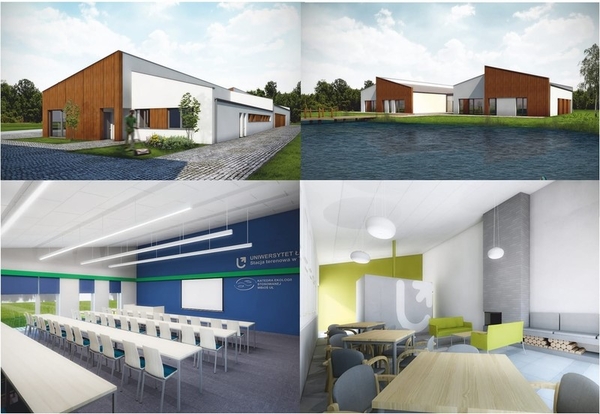 Visualisations of buildings and rooms of the University of Lodz Environmental Field Research Station in Tresta
Visualisations of buildings and rooms of the University of Lodz Environmental Field Research Station in Tresta
Thanks to the actions taken, the University of Lodz Environmental Field Research Station in Tresta, which is administered by the Department of UNESCO Chair on Ecohydrology and Applied Ecology at the Faculty of Biology and Environmental Protection of the University of Lodz, will be able to re-integrate research teams from Poland and abroad and will become a place of inspiring scientific and educational events.
The investment is scheduled for completion in the first half of 2026.

Research conducted at the University of Lodz Environmental Field Research Station in Tresta:
- Implementation of an ecohydrological approach – integrating hydrological, ecological and biogeochemical processes to optimise ecohydrological solutions for sustainable catchment management;
- Ecosystem biotechnologies – the use of biological processes to regulate biogeochemical cycles in order to reduce point pollution and improve the self-purification process of rivers;
- Identification of the hierarchy of factors causing toxic cyanobacterial blooms in dam reservoirs in order to manage the catchment effectively;
- Impact of climate change on aquatic ecosystems;
- Monitoring and control of ecological processes in eutrophic lakes and dam reservoirs;
- Bioidentification – development and application of molecular methods for risk assessment and early warning system for threats in aquatic ecosystems;
- Development and application of bioremediation and phytotechnology as tools for the restoration of freshwater and terrestrial ecosystems;
- Development of multifunctional use of aquaculture for the retention and improvement of water quality, protection of endangered or overexploited species and improvement of the productivity of aquatic ecosystems;
- The role of fish as a regulator of biological processes and an indicator of environmental degradation;
- Development and adaptation of aquaculture to climate change;
- Increasing the efficiency of aquaculture;
- Reduction of the negative impact of aquaculture on the environment.
Source: Faculty of Biology and Environmental Protection, University of Lodz
Graphics: DWArchitekci
